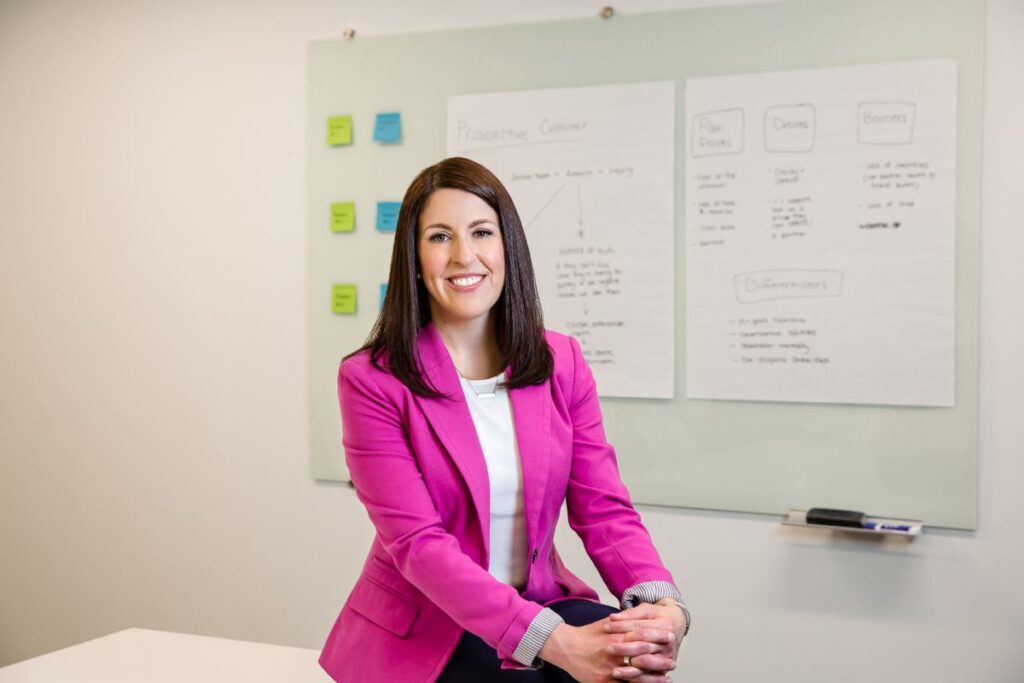What’s a Small Business Advisor for Entrepreneurs?
In 2021 I wrote an article that began: “When people call Ellevated Outcomes a coach instead of a business advisor, my stomach drops.” And while I still may have haunting traces of this dread, after 6+ years in this industry, my confidence has grown and I’m a bit less precious when someone calls us their small business coach. I’ve come to accept that most people who find us are initially seeking a coach – until they understand what makes us unique as a Small Business Advisor for Entrepreneurs…

What’s a Small Business Advisor for Entrepreneurs?
I’m going to break this question into its 3 parts, starting with: Who hires an Advisor?
Here’s my Cliff’s Notes answer: smart people hire advisors! I realize that sounds cheeky and self-congratulating, but hang with me. The most successful and top-of-their-game people in the world, hire and rely on advisors. There are boards of advisors for corporations and non-profits. Tax advisors. Financial and wealth advisors.
One thing to notice is that most of the industries where the term “advisor” is well-known, relate to money. The connective tissue is that people – and businesses – who want to grow (financially) bring in advisors.
What’s a Small Business Advisor?
A Small Business Advisor specializes in small businesses. (Sorry, I know that wasn’t the most impressive answer). But I make that distinction to point out: the needs and motivations of a small business – and its owner – are very different than those of a larger company. Money flows differently, emotions are extremely different, and the end game is different. It’s important to have a Small Business Advisor who understands the nuance of small business and its very real effects.
For our target market, we qualify a small business (vs start-up) by a couple characteristics:
- Solopreneur to ~25 people and
- “Traditionally” funded, meaning: bootstrapped, having loans, or in very limited circumstances: a few private investors.
But to clarify: we don’t work with start-ups. These businesses are often in the tech space and funded by VC money; and therefore, they’re expected to grow at exponential rates. I’m not saying these are “bad.” But back to motivation, needs, money flow, and culture flow, it’s an extremely different model. Start-ups have their own type of specialized coaches and advisors; and if your business is a true start-up, you should seek a tech coach or advisor. There are plenty!
Why include “for Entrepreneurs” in our description?
For this, I turn to Seth Godin’s definition of freelancer vs entrepreneur.
Freelancers get paid for their work. You get paid when you work. When you’re asleep, you don’t get paid anything.
An entrepreneur uses other people’s money to build a business bigger than themselves so that they can get paid when they sleep.
The entrepreneur has no trouble selling their business because the business is a living, breathing entity that isn’t related to what they do all day.
One small disagreement: I don’t believe that an entrepreneur needs to use others’ money. But that aside: this is the reason I specify being a Small Business Advisor for Entrepreneurs. An advisor within this niche (like Ellevated Outcomes, wink wink) specializes in turning small businesses – that are often operating as freelancers – into entrepreneurs. This means: your business becomes a living, breating entity that has potential to become bigger than you.
When should I hire a Small Business Advisor?
Before moving into the next set of questions, I want to call out the elephant in the room: of course, these are going to be biased to Ellevated Outcomes’ perspective. So please know that I know that; and of course, take the answers as you like!
Minimally, at your business’s 2 year anniversary. We’ve learned that 2 years is when clients perceive the biggest value from our work. (Not when they receive the biggest value but when they perceive it). Two years seems to be the right amount of time for a small business to find good product-market fit (or not and change directions).
In our personal experience, we also see a few common time-tipping points for when small business owners come to us:
- 2-5 years
- 7-10 years
- 11-14 years
You may critique this and respond, “um yeah: this just covers all the years.” So if you noticed that: fair! But the reason I present this way is to represent the small business failure cliffs.
How much revenue or income should I have?
This is going to range significantly, but I want to share real numbers and examples. As you know, I’m a fan of specificity and talking openly about money! So remember, we’re working with businesses that range in employee count from solopreneur to ~25 people. Therefore, the range varies widely.
Solopreneur
We work with businesses who are coming to us from producing $20,000 to $200,000 solo (and lots of stops, in-between). And I want to further specify: if you’re a solo making $20K, you have multiple sources of income, whether you have a spouse/partner contributing to the household or complementing income streams. And then on the other side of that solopreneur range, you may be just shy of $200K, trying to get to reach the $250K milestone.
Building a Team*
If you have a small, growing team (call it 3-10 employees), depending on what you sell, your income is likely between $500K to $2M.
Established Team*
And lastly, if you have a larger, established team (again, to us: “large” is relative for a small business, so we’re talking about 25-30 employees), you’re likely coming to us producing $2M-10M in annual revenue.
*Because we work with a range of industries, the type of business significantly affects employee to revenue ratio; so for some businesses these two categories are flipped.
What problems can a Small Business Advisor help me solve?
Because we work with Creative Small Businesses, as well as high-end Hospitality & Professional Services, the core problem we solve for small businesses, is what Seth Godin poses above: How can I transition from freelancer to entrepreneur? In other words:
How do I make my business sustainable?
Depending on your stage and size of business, this may look like:
Solopreneur
You’ve moved beyond trading time for money
Small Team
Your clients and team can work without you, to run the day-to-day.
Larger Team
You’re not the primary face of the business. Clients and employees have empowered points of contact that are your lines of defense. There are established leadership paths in place, a succession plan, and the option to sell, when you choose.
What’s really the value of a Small Business Advisor?
Alongside tangible, number and financial-based outcomes, over the past year, I’ve heard clients articulate 3 additional value points they receive from working with us.
1. We design a path (work to do) that’s different than you knew.
One of our smartest clients said to me during our prospect meeting: “What are you going to do for me that I can’t do on my own?”
I responded to her in complete honesty, saying: “Look. I think you’re brilliant, and I don’t know if we’re going to accomplish something that you couldn’t on your own. But I know this: with our help, you’ll get there more efficiently and effectively.” She signed with us that evening. We’re going on 3 years together.
So in all: the outcome may be the same as you imagined; but we likely know a more optimal way to get you there: balancing speed with integrity, so that the solution sticks. It’s a path you don’t even know exists.
2. We know your business as well as you do.
This is one of the extreme values of working with clients for multiple years. For the right people, we become a true extension of them: an outsourced Strategy Department.
We know their clients, their pricing model, the personalities and strengths/weaknesses of their employees – not to mention the owner themselves. Whether we’re working with a client on a strategic initiative or a one-off emergency, they don’t have to waste time getting us up to speed on the players, numbers, and dynamics.
We occupy a role that balances being inside and outside the business. We can see things objectively and with a wider, panoramic lens. As some say, “You can’t see the picture when you’re inside the frame.”
3. We help you carry the business mental load.
Being a business owner is exhausting- speaking for a friend, obviously;) There’s all the stuff you have to do: client work, fulfilling orders, marketing, managing the team, reviewing monthly finances… This is operational; it doesn’t include CEO work. So to carry the load of things you have to do and the things you want to do (or more likely: should do) is downright overwhelming. It is so, so much.
So to have someone who knows your business intimiately; knows you intimately; and will carry that mental load with and for you, is a tremendous value to our highest performing clients.
Like our beloved Heather Mathias, CEO of Mathias Collective says:
I’m exhilarated that someone else is paying attention to my business.
When I send her agendas and objectives for our meetings, she calls them “balm for her soul.” It always makes me laugh, but I know exactly what she means. When you’re the person running everything, to walk into a meeting with the comfort: “They’ve got me; I just need to do my prep and be present.” It is balm for the business soul.
In summary, smart people hire Business Advisors.
Above all, there’s something we really want people to know. You don’t hire a business advisor because something is wrong with you or wrong with your business. You hire a small business advisor because that’s what smart people do.
Having the right advisor(s) is a power move. It’s an accelerator to get you where you want to go. I have 5 advisors for Ellevated Outcomes, not to mention other people I constantly call for help, weekly. You know that you’ll get where you want to go, faster and more deeply with more (smart and thoughtful) brains on the case. You’re a learner, and you’re a forward-thinker.
Your small business hasn’t yet scratched the surface of its potential, and your future self doesn’t want you to leave anything on the table. That’s why you hire a small business advisor.


